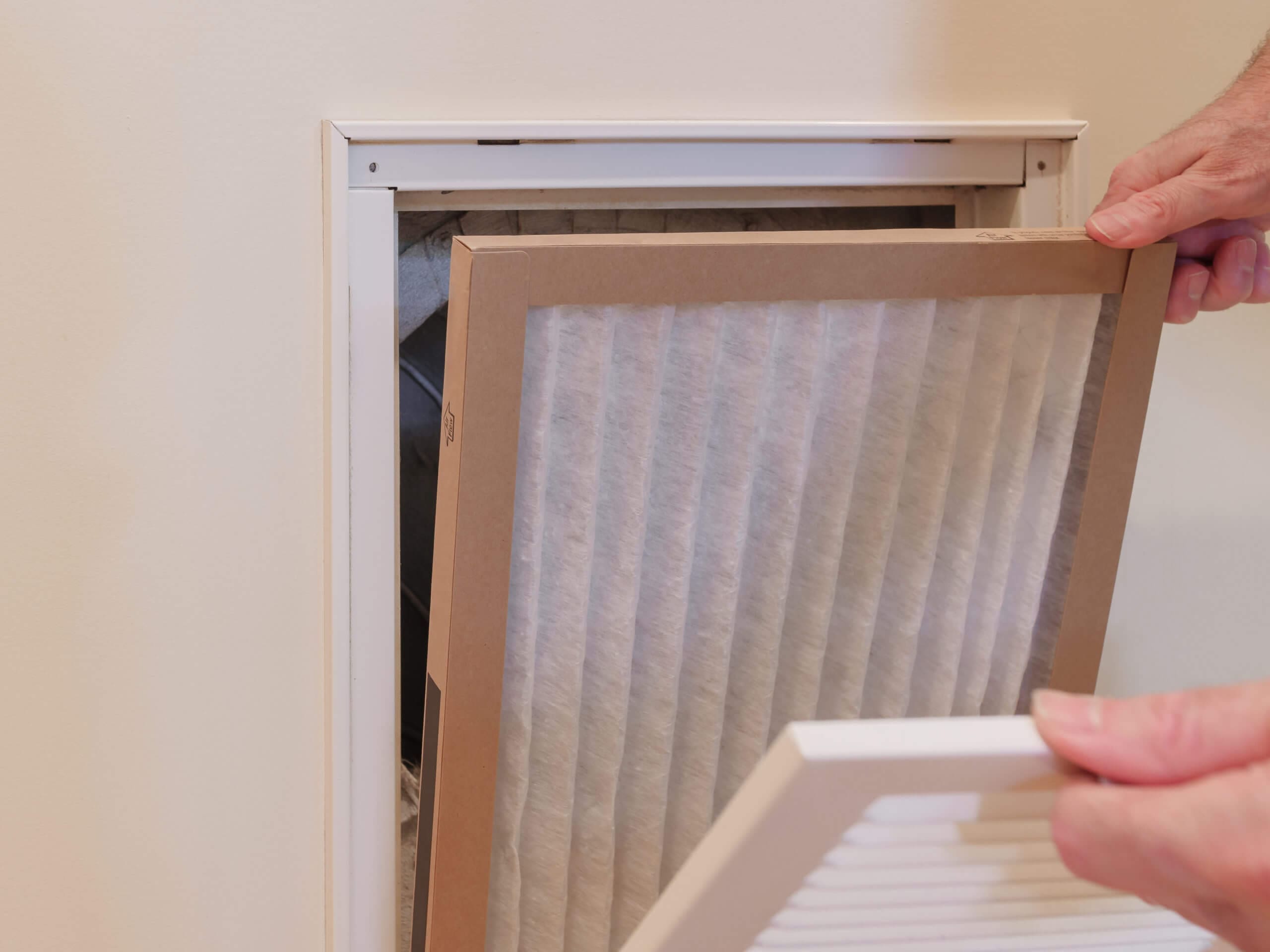Home air filtration is a vital component of good indoor air quality. It’s also an overlooked home HVAC system element. With little general knowledge of what constitutes a good air filter, it’s common practice to simply choose the cheapest option. Another misconception is that the air filter originally installed in the home, either by the builder or previous owner, is the only air filter choice for the space.
This Q&A is here to combat home air filtration misconceptions and answer frequently asked questions about home filters. Whether you’re considering an air filter upgrade but don’t know which to choose from or just generally looking for a filtration overview–we’ve got you covered! Here’s how our indoor air quality experts answered your home air filtration questions.
Filtration Basics
Question: What is meant by “air filter?”
Answer: An air filter is a device that quite literally filters the air. A home air filter efficiently removes indoor air pollutants and contaminats from your home or indoor space. It does this by capturing various harmful particles as air flows through.
The air filter in the home’s HVAC unit is likely located near the furnace or air conditioning system handler. Return vent air filters are found at the front of the vent, where the return duct enters the air handler. Return vents are located either on the floor, in the ceiling or along walls. The number of filters in your home will depend on the size of the space, and number of HVAC systems. (Because, yes, bigger homes often have more than one HVAC system.)
Question: How often should I change the air filters in my home?
Answer: The answer to this question will actually depend on the air filter in question. The dirtier an air filter gets, the less efficient it becomes. And without proper filtration, your home’s air quality will begin to suffer quickly.
You should check washable filters, throwaway filters, and air filters with MERV ratings below MERV 10 at a minimum, every 90 days. More than likely, after three months, the filter will be full of dirt, dust and allergens. At which point, you will need to purchase a new one.
For higher-rated MERV air filters like MERV 13-16, these filters shouldn’t need changed until five to six months of use. If the filter does not appear to be full at the half-year mark, it’s okay to go a bit longer before changing.
Specific factors like pets in the home, allergy sufferers or high outdoor air pollution levels in your area can all impact the efficacy of your home’s air filters. And, the frequency with which they need to be changed. It’s important to check the air filters in your home on a regular basis! Only then can you learn the particular ins and outs of your home’s system.
Choosing The Best Home Air Filter
Question: What is a good air filter for my home?
Answer: Choosing the best home air filter is usually a compromise between the filter’s ability to capture particles while maintaining strong air flow. To go a bit more in depth, a good filter should be capable of capturing and reducing a majority of indoor pollutants. However, a good filter should be able to do so without reducing air flow. Filtering out harmful indoor pollutants is a seamless process with the right filter choice.
The actual exact model or type of air filter that is best for residential use will depend. For the average home HVAC system, a MERV-13 air filter is the top recommendation. These filters are able to drastically improve air filtration and air quality. This MERV rating level can capture particles as small as 0.3 microns. Most HVAC experts would not recommend a home air filter above MERV-13. This is because you then run the chance of blocking off air flow or suffocating the HVAC system. MERV-13 is also the highest level MERV filter that improves air quality without requiring costly home upgrades to accommodate a higher-rated filter.
If, for whatever reason, your home’s HVAC system is equipped to handle a higher MERV filter or even a HEPA filter, then you have the option. An IAQ specialist or HVAC contractor can help determine what your home’s HVAC system can handle.
Question: Is it better to buy a high-quality HVAC filter that you change infrequently, or multiple cheap air filters that you have to change more often?
Answer: As indoor air quality experts and enthusiasts, we’re of course going to recommend the higher quality filter. We’ve read the studies and the data on just how much of an impact indoor air quality has on overall occupant health and wellbeing as well as home quality.
That said, we’re also assuming high-quality in this instance means higher-rated. Higher rated air filters trap more particles and do a more efficient job of capturing and filtering out the smaller particles. A filter receives a rating based on its ability to remove pollutants from the air, thus making it “high quality.”
Of course, we also understand that you’re less likely to find the more expensive option necessary if you don’t notice a problem. Keep in mind that even if you think your home is doing fine with the cheaper filter, a difference is noticeable when you upgrade.
Every air filter is replaced at some point. There is no magical filter that can clean or replace itself. So, why not choose the option that is replaced less often, actually likely saving you money in the long-run. And finally, I’ll suggest the high-quality HVAC filter because it’s less maintenance. Even we don’t want to go through our homes regularly replacing air filters for the fun of it!
Air Purifier Filters
Question: How often should I replace the HEPA filter in an air purifier that is running 24/7 and never turned off?
Answer: For standalone air purifiers, it’s important to check with the manufacturer directly. Single-room air purifiers all differ. Some even have two different filters that need to be replaced at different times. As a general rule of thumb, replace the smaller filter every three months and replace larger filters every five-six months.
Alternatively, a whole-home purification system uses the air filters in the home. So, general air filter rules apply. Thus, there is no extra work involved to make sure the purifier works as effectively as possible.
Question: When using an air purifier with a HEPA filter, should the windows be closed?
Answer: Yes, the windows should be closed! If windows are open, you are letting more outdoor contaminants into your indoor breathing space. This would shorten the life of a single-room air purifier’s air filters, meaning they would need to be replaced more often (costing more money to operate).
Answering Your IAQ Questions
Those are the basic ins and outs of home air filters. Do you have a specific question about HVAC air filtration that we didn’t answer here? Or, maybe another question or concern about your home’s indoor air quality? Feel free to reach out to us via Twitter @IaqWorks! We’re happy to have our experts answer any and all relevant home IAQ questions.




